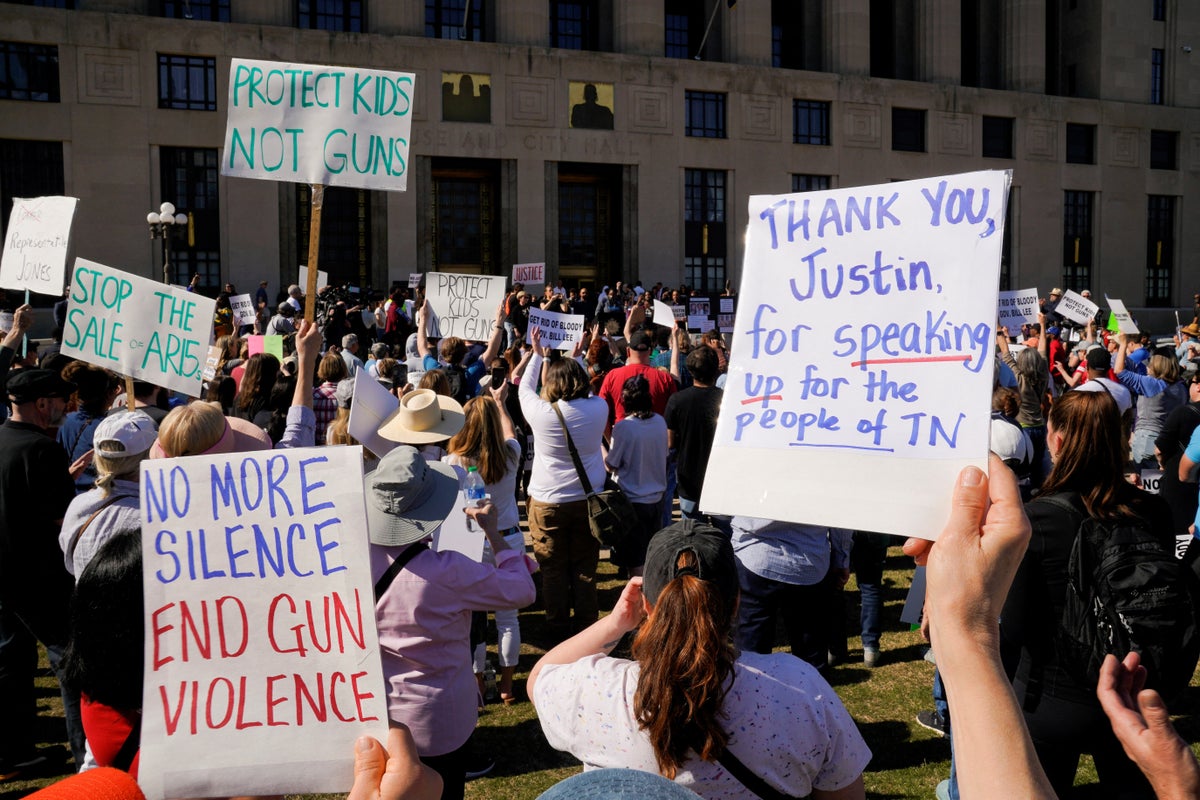
Tennessee Governor Bill Lee will sign an executive order to strengthen background checks for firearm purchases and is calling on state lawmakers to draft a more-expansive “order of protection” law to keep guns out of the hands of people who could be a danger to themselves or others.
His announcement on 11 April comes just days after the extraordinary move from the state’s Republican-controlled House of Representatives to expel two Black Democratic members who joined hundreds of protesters at the state capitol demanding lawmakers urgently adopt gun control legislation in the wake of a school shooting in Nashville.
Nashville’s city council voted to reappoint one of the lawmakers, state Rep Justin Jones, who represents the city in the state House. He was sworn back into office on 10 April. Another expelled lawmaker, state Rep Justin Pearson of Memphis, also is expected to be reinstated.
The state’s Republican governor asked state lawmakers for “a new strong order of protection law” that “will provide the broader population cover, safety, from those who are a danger to themselves or the population.”
“This is our moment to lead and to give the people of Tennessee what they deserve,” he added.
The state’s current order of protection law prevents people convicted of domestic abuse, sexual assault and stalking from possessing a firearm; authorities would be “flagged” if they tried to purchase one from a licensed dealer.
A new measure – broadly under the umbrella of “red flag” laws strongly opposed by many Republican officials – could expand that list to potentially protect current and former spouses and people who live or have lived together, dating partners, and relatives, among others.
Gun reform advocates have argued that such extreme risk protection order laws might have prevented the massacre in Nashville, when an assailant armed with an AR-style rifle and two other firearms killed three nine-year-old children and three school workers on 27 March, the deadliest attack inside a school in the state’s history.
“When young people speak out and show up, we’re impossible to ignore,” Vanderbilt University student and Students Demand Action volunteer Bobbi Sloan said in a statement.
“We’re optimistic about Governor Lee’s announcement, but we’re not going to let off the gas pedal. It’s long past time Tennessee lawmakers took action to keep us safe, and we’re hopeful that today’s call to action will give legislators the push they need to take life-saving action,” she added.

The governor’s executive order establishes a 72-hour period for reporting new criminal activity and require courts to submit timely information to authorities for review. The order also directs that agency, the Tennessee Bureau of Investigation, to examine the current process for purchasing firearms.
At least 19 states and Washington DC have enacted so-called “red flag” laws.
Tennessee lawmakers initially bristled at any new gun control measures in the wake of the Nashville mass shooting, but Republican lawmakers introduced a school safety bill that does not address firearms at all.
Meanwhile, Democratic state legislators said they were told that any of their gun reform-related bills were off the table until 2024, and Senate Judiciary Chair Todd Gardenhire told local outlet Tennessee Lookout that his committee would not hear anything related to gun bills this year.
The new legislative push from the governor’s office also follows his signature on a law in 2021 that makes it easier for people to openly carry handguns without a permit. More than half of US states have enacted similar permitless concealed carry laws, measures that have been rapidly adopted by lawmakers across the US as part of what right-wing activists have called a “constitutional carry” movement in recognition of the Second Amendment.
A slate of legislation from Tennessee Democratic lawmakers in the wake of the Nashville shooting includes a proposed ban on bump-stock conversation kits and high-capacity magazines.
Another Democratic bill proposes a similar “red flag” law that would allow family members and law enforcement officials to petition a civil court for an extreme risk protection order that would allow authorities to temporarily remove weapons from a person deemed a risk to themselves or others.
Last year, President Joe Biden signed into law the Bipartisan Safer Communities Act, which was drafted by Congress in the wake of the massacre at Robb Elementary School in Uvalde, Texas in May.
Among other things, the bill provides federal funding for states to enact red flag laws. In February, the president announced that the US Department of Justice would provide $231m to states to implement such measures and other crisis intervention programmes.







